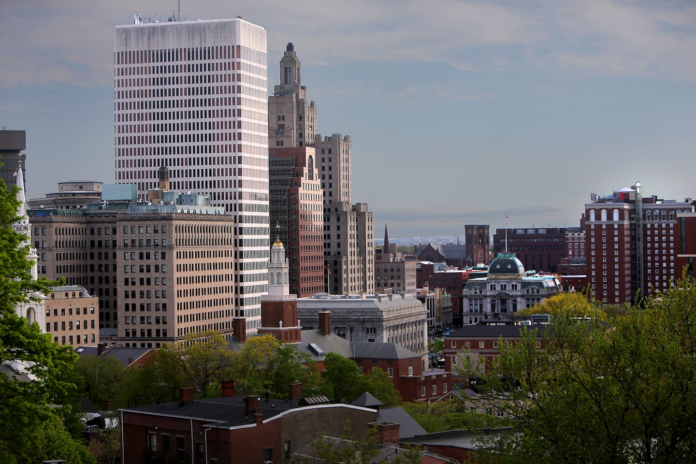That’s just what South Side residents have done for the past two years. They thoughtfully and passionately contributed their ideas and hopes for the city they call home. They raised a clear and consistent concern that the plan perpetuates the industrial status quo, enabling the development and expansion of polluting businesses in the Greater Port of Providence’s industrial/waterfront zones . These areas already impose a heavy burden on South Side residents, subjecting them to dirty air, excessive noise, and serious health risks. Their message was simple: this plan could be a critical opportunity to transition away from polluting industries and create pathways for green economy job growth and a healthier future for the South Side community.
Providence’s Comprehensive Plan , expected to be voted on by the City Council later this month, charts the course for the city’s future over the next decade. The draft plan , which has gone through a public process over the last two years, lays out Mayor Brett Smiley’s vision for the city. Such an important and consequential document requires the thoughtful input of residents whose futures it will shape.
Yet, the mayor’s office repeatedly dismissed their calls for change.
Get Rhode Map A weekday briefing from veteran Rhode Island reporters, focused on the things that matter most in the Ocean State. Enter Email Sign Up
It should be no surprise then that South Side residents appealed to the City Council to intervene on their behalf.
In early October, the City Council leadership showed they heard South Side residents and took a bold step. They proposed revisions to the draft Comprehensive Plan that would restrict some industrial activities — specifically, 24 polluting uses like toxic waste storage, chemical manufacturing, and scrap metal processing in the Greater Port of Providence’s industrial/waterfront zones. These proposed changes were inspired by the specific industrial facility uses identified in the Green Justice Zone Act, a piece of legislation developed by the Racial and Environmental Justice Committee and introduced in last year’s legislative session. It sought to protect neighborhoods like South Side from further environmental harm.
These revisions were far from radical. They wouldn’t have shut down any existing businesses, nor would they have displaced unionized workers. They simply would have blocked the expansion of polluting industries and made it harder for harmful businesses to set up shop in a community that already bears a disproportionate environmental burden. More importantly, they would have signaled a shift toward a more sustainable future for Providence and South Side —a future that could open the door to green economy jobs, cleaner air, and a healthier environment.
Advertisement
For a brief moment, it seemed like progress was on the horizon. But less than a week later, that hope was dashed when the City Council reversed course. The council rescinded the proposed revisions and instead offered up a confusing, vague proposal that, in effect, ensured the preservation of the industrial status quo. What had caused this abrupt change? The answer, sadly, is all too clear: obstructionist organized labor.
Organized labor tied to polluting industries united against the City Council leadership’s proposed revisions.
Why would organized labor value polluting jobs and industry profits over the health and well-being of the South Side community, especially when these revisions would not shut down any existing business or cause the loss of any organized labor jobs? It’s essential to recognize that there is a divide within the labor movement, with some unions supporting the transition to a clean energy economy, understanding that the future of good, sustainable jobs lies in industries that protect both workers and the environment.
It seems that future restrictions on polluting industries might limit the potential for additional union jobs and industry profits, and that was too much to bear for organized labor groups.
The revisions were simply an effort to ensure that the future development of the port industrial/waterfront zones would align with the city’s long-term goals of environmental sustainability. Yet, organized labor, seemingly unwilling to entertain any challenge to the status quo, rejected even this modest step.
Advertisement
For decades, South Side has been a sacrifice zone, where polluting industries have thrived at the expense of the people who live there — primarily Black, brown, Indigenous, and other communities of color. The community suffers from high rates of asthma, respiratory illnesses, and other chronic conditions.
The revisions to the Comprehensive Plan introduced by the City Council would have been a first step — albeit a small one — toward addressing this history of environmental injustice. But when it came time to weigh the health and well-being of South Side residents against the possibility of future jobs and profits for polluting industries, the scales tipped in favor of the latter.
Until our leaders are willing to prioritize the health of our communities over the interests of polluting industries, the South Side of Providence will remain just another sacrifice zone. And that is a failure we cannot accept.
Darrèll Brown is the vice president of Conservation Law Foundation Rhode Island. Richard Stang is the senior attorney for Conservation Law Foundation Rhode Island.



